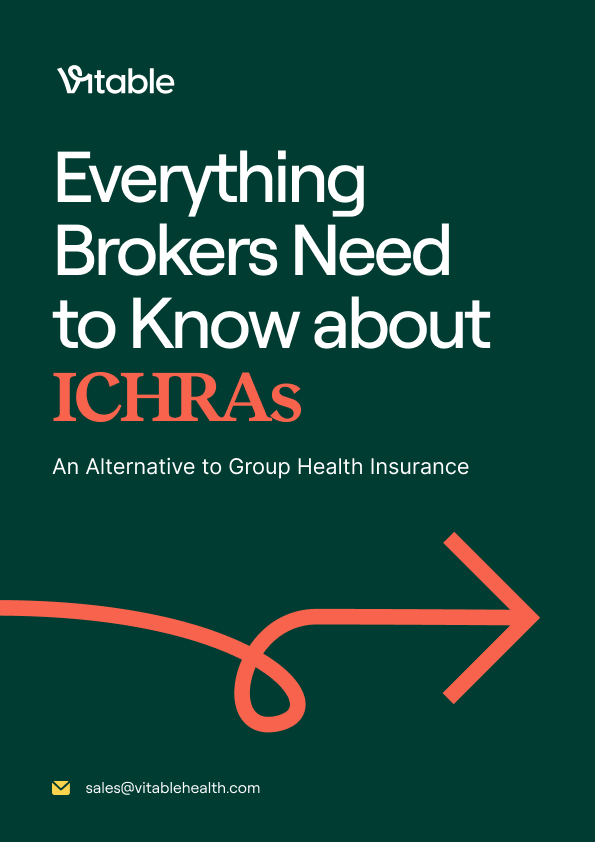Your Guide to ICHRA Compliance

Don't be intimidated by ICHRA compliance—this article demystifies the different regulations governing the ICHRA, making it easy for you to provide affordable and compliant health insurance.
Compliance Rules and Regulations
In today's healthcare landscape, employers are looking for affordable and flexible ways to provide good health benefits, while ensuring compliance with regulations. The Individual Coverage Health Reimbursement Arrangement (ICHRA) is an employer-funded, tax-advantaged health benefit that allows businesses to reimburse employees for their health insurance premiums and qualified medical expenses. With its flexibility, ICHRA empowers employers to design customized health benefits while adhering to the regulations set forth by the Affordable Care Act (ACA). Compliance with these regulations is paramount when offering ICHRA to employees, ensuring the seamless operation of this innovative health benefit.
Affordable Care Act (ACA) Requirements
Under the Affordable Care Act (ACA), employers with 50 or more full-time equivalent employees (FTEs) are required to offer health coverage to their employees. The Individual Coverage Health Reimbursement Arrangement (ICHRA) presents a viable solution for employers to meet this mandate, provided certain criteria are met.
ICHRA can fulfill the employer mandate if it is deemed affordable for employees, and all employees who opt into the ICHRA have individual insurance that meets the minimum essential coverage (MEC) requirements. "Affordable" means that the amount employees have to pay out-of-pocket for a self-only lowest-cost silver plan must be less than a specific percentage of their household income (currently set at 8.39% for the year 2024).
Determining ICHRA Affordability
To determine affordability, employers consider the employee's required contribution for the self-only lowest-cost silver plan minus the ICHRA allowance. If the resulting amount remains below the affordability threshold, the ICHRA is considered affordable, and employers fulfill the ACA's employer mandate. As stated above, the affordability threshold is currently set at 8.39% for the year 2024.
However, if the affordability threshold is exceeded, employees may be eligible for premium tax credits (PTCs) and can potentially opt out of the ICHRA to obtain insurance coverage through the Marketplace or State exchange while still receiving PTCs.

Download 2025 Employer Guide to ICHRA
Vitable’s ICHRA Guide gives employers a clear, step-by-step resource for building smarter, ACA-compliant benefits.
This guide explains how ICHRAs work, who qualifies, and how Vitable simplifies setup, onboarding, reimbursements, and compliance — while giving employees more flexibility, control, and care.

Download Vitable’s 2025 Broker’s Guide to ICHRA
The Broker Guide to ICHRAs is a comprehensive resource that helps brokers understand, sell, and manage Individual Coverage HRAs with confidence.
This guide covers everything from compliance and class design to administration flows, case studies, and how Vitable streamlines quoting, enrollments, and reimbursements for brokers, employers, and employees.
Reporting and Documentation Requirements
Employers offering ICHRA must file specific forms with the IRS, depending on their business size. These forms provide information about the coverage offered and must be submitted within specified deadlines. Additionally, employees who meet ICHRA eligibility must receive specific IRS forms, outlining their coverage details. Employers must ensure timely distribution of forms and meet the reporting deadlines set by the IRS to ensure that their HRA plan remains compliant.
Small Employers
For small businesses with fewer than 50 full-time employees, staying compliant with the IRS involves some specific ICHRA reporting requirements. To break it down: businesses must submit two key forms to the IRS - Form 1095-B, which details the organization's coverage to each employee with an ICHRA, and Form 1094-B, a summary that totals the number of Form 1095-Bs sent. Moreover, it's essential to provide each full-time employee, including those who worked full-time for just a month during the tax year, with their individual Form 1095-B. This form contains codes explaining how their affordability was calculated. Employees should receive these details by January 31. For the IRS, the deadline is February 28 for those submitting paper forms and March 31 for electronic filers.
Applicable Large Employers
Applicable Large Employers (ALEs), those with 50 or more full-time employees, have additional compliance considerations for ICHRA. Similar to the requirements for small employers, ALEs must file Form 1094-C with the IRS, which provides information about the coverage offered to employees. Additionally, Form 1095-C must be provided to all employees who were full-time for at least one month. These forms contain codes that convey how affordability was calculated. It is essential for ALEs to demonstrate compliance with the ACA's employer mandate and meet the reporting requirements within the specified deadlines.
In addition, all Applicable Large Employers (ALEs) are obligated to provide Minimum Essential Coverage (MEC) to at least 95% of their full-time employees and to the dependent children of those employees. The offered coverage must meet a minimum value and be deemed affordable. Failure to meet these standards may result in IRS penalties. It is important to keep these requirements and restrictions in mind when designing your plan benefits and submitting proper documentation to the IRS.
Confidentiality and Documentation
Employers must ensure employee confidentiality regarding protected health information (PHI). This includes maintaining the privacy and security of employee health information and following HIPAA regulations. Proper documentation and record-keeping are also essential for ICHRA compliance. Employers should maintain accurate and detailed records of ICHRA-related transactions and employee information to fulfill reporting and compliance requirements.
Tax Implications of ICHRA Compliance
Ensuring compliance with regulations is not only crucial for the smooth operation of an Individual Coverage Health Reimbursement Arrangement (ICHRA), but it also has significant tax implications for both employers and employees. Failure to comply with HIPAA and IRS rules can result in the loss of tax deductibility for reimbursements, as well as potential penalties or audits.
Employers must ensure the affordability of their ICHRA offerings, protect employee confidentiality, and diligently adhere to IRS regulations for proper documentation. Make sure to stay informed about the latest regulations to maximize the benefits of an ICHRA while maintaining tax compliance.
Vitable: Streamlining ICHRA Compliance
Vitable is an affordable HRA administrator that simplifies the process of setting up and managing an ICHRA for businesses. With Vitable, employers can easily customize their ICHRA based on their unique requirements, ensuring compliance with IRS regulations and employee confidentiality. Vitable's user-friendly platform provides individual plan recommendations to employees and guides them through the enrollment process, resulting in a positive and hassle-free experience.
FAQs
Can business owners participate in ICHRA?
Business owners, such as sole proprietors, partners in a partnership, and S-corp shareholders, are generally not considered employees and are therefore not eligible to participate in ICHRA. However, C-corp owners can participate in ICHRA.
What are the penalties for non-compliance with ICHRA regulations?
Non-compliance with ICHRA regulations can result in the loss of tax deductibility for reimbursements and potential penalties imposed by the IRS. It is crucial to adhere to the rules and ensure proper reporting and documentation.
How does ICHRA compliance impact premium tax credits?
Employees participating in an ICHRA cannot collect premium tax credits unless the ICHRA allowance offered by their employer is deemed unaffordable. Affordability is determined based on the employee's out-of-pocket cost for a self-only, lowest-cost silver plan.
What is the role of Vitable in ICHRA administration?
Vitable offers a smarter, more streamlined way to manage ICHRA benefits, making it easy for employers to support their teams with personalized healthcare coverage. Through our user-friendly platform, employees receive individual plan recommendations and hands-on guidance during enrollment, creating a seamless experience that feels approachable, not overwhelming.
How does ICHRA compliance impact employee benefits?
ICHRA compliance ensures that employees have access to affordable and compliant health benefits. It allows employers to offer individual health insurance reimbursements and provides employees with flexibility in choosing their health plans while adhering to ACA requirements.
Book your consult with Vitable
Our team knows the ins and outs of the health insurance marketplace and will guide you towards the solution that makes the most sense for your business and your team. Come with questions! Our experts are happy to dig into the details to get you the clarity you need.
During the call, Vitable will run a cost-benefit analysis on your company's current healthcare spending and show you different ways you can save—without sacrificing plan quality. After your consult, Vitable will design a unique plan for your employee's health insurance, including suggested plans and accounts, plan policy documents, and the annual budget. Book your call today!
Ready to learn more?
Stay ahead with the latest insights on healthcare, benefits, and compliance—straight to your inbox.
Get a quote
Get a personalized health benefits quote tailored to your company’s unique needs.
Vitable helps employers provide better healthcare to their employees and dependents by improving accessibility, cost, and quality.